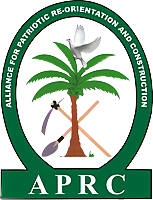History
The APRC was formed in 1996 to support coup organiser Yahya Jammeh's successful campaign in the 1996 presidential election. The party would rule over the country for the next twenty years, with subsequent elections being heavily controversial and the APRC facing very little opposition. For instance, no other candidates ran in 33 of the 45 National Assembly seats won by the APRC in the 2002 parliamentary elections, as the main opposition party, the United Democratic Party boycotted what it described would be an unfair election. [4]
Despite such criticisms, the APRC was described as very popular amongst the Jola ethnic group. In terms of nationwide percentage, the party's best parliamentary election result was in 2007 (59.7%), while its best presidential election result came in 2011 (71.5%). [5]
Jammeh was ultimately denied a fifth term in the 2016 presidential election by opposition candidate Adama Barrow, and the APRC lost a whopping 38 seats in the parliamentary elections the following year, going into opposition for the first time. [6]
Fabakary Jatta, the current leader of the APRC, has sought to distance the party from Jammeh and the alleged crimes committed under his twenty year rule. In 2021, Jatta endorsed Barrow's 2021 re-election campaign. Jammeh criticised the endorsement. After the 2022 parliamentary election resulted in a hung parliament for the first time in the country's history, the APRC formed a coalition agreement with Barrow's National People's Party. This caused internal turmoil, as many APRC members, including some within the party establishment, remain loyal to Jammeh. [7]
This page is based on this
Wikipedia article Text is available under the
CC BY-SA 4.0 license; additional terms may apply.
Images, videos and audio are available under their respective licenses.
